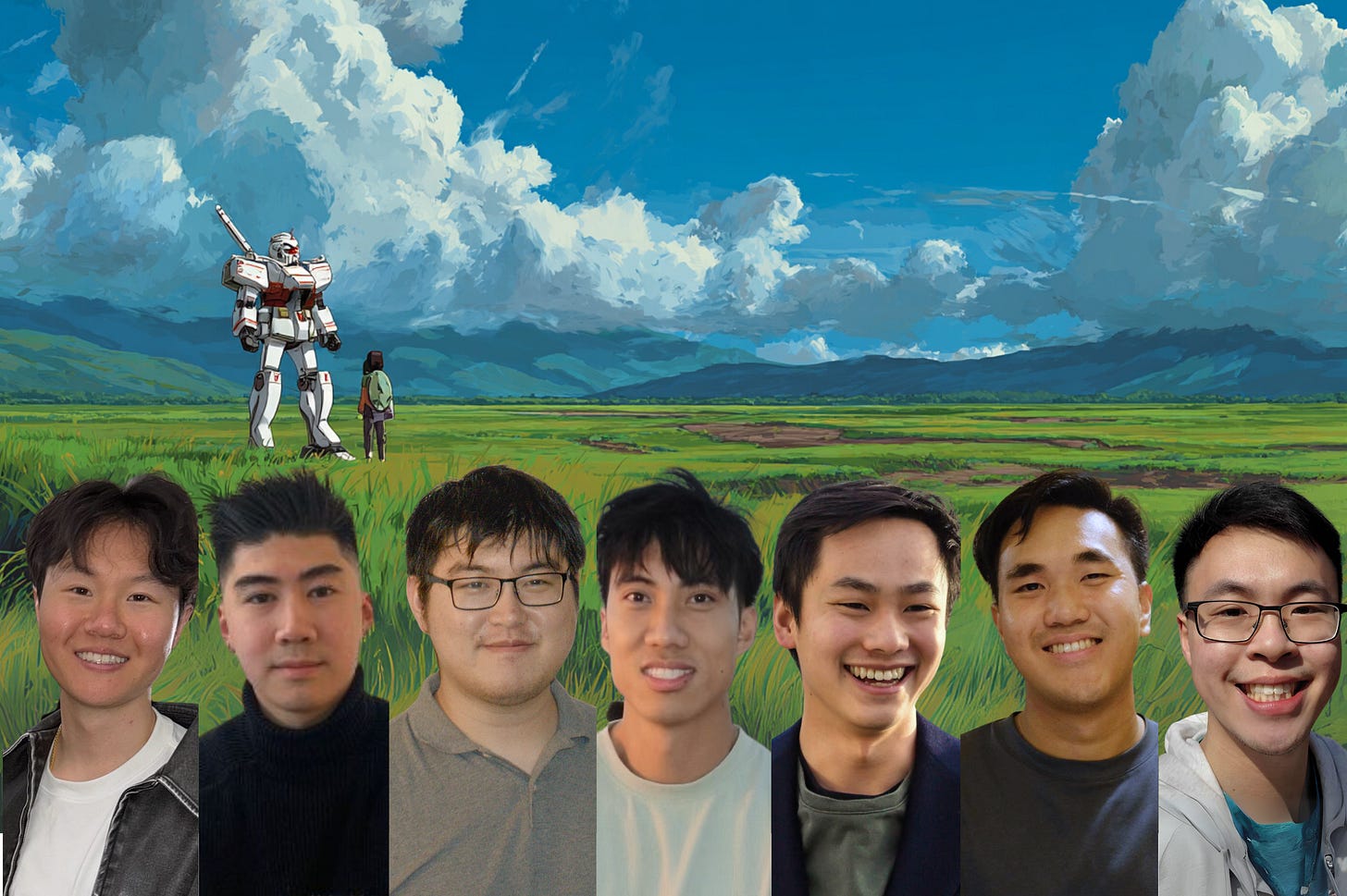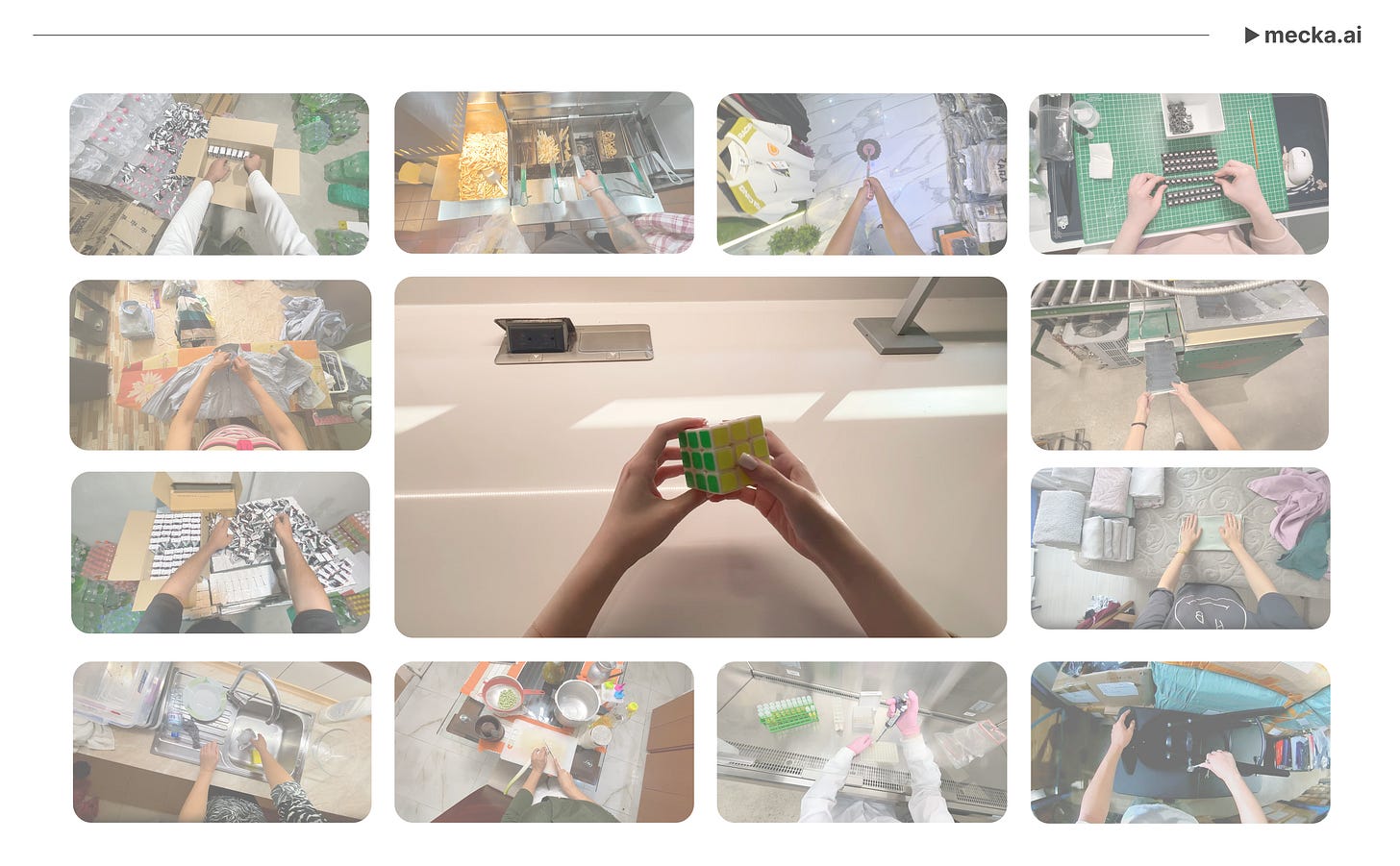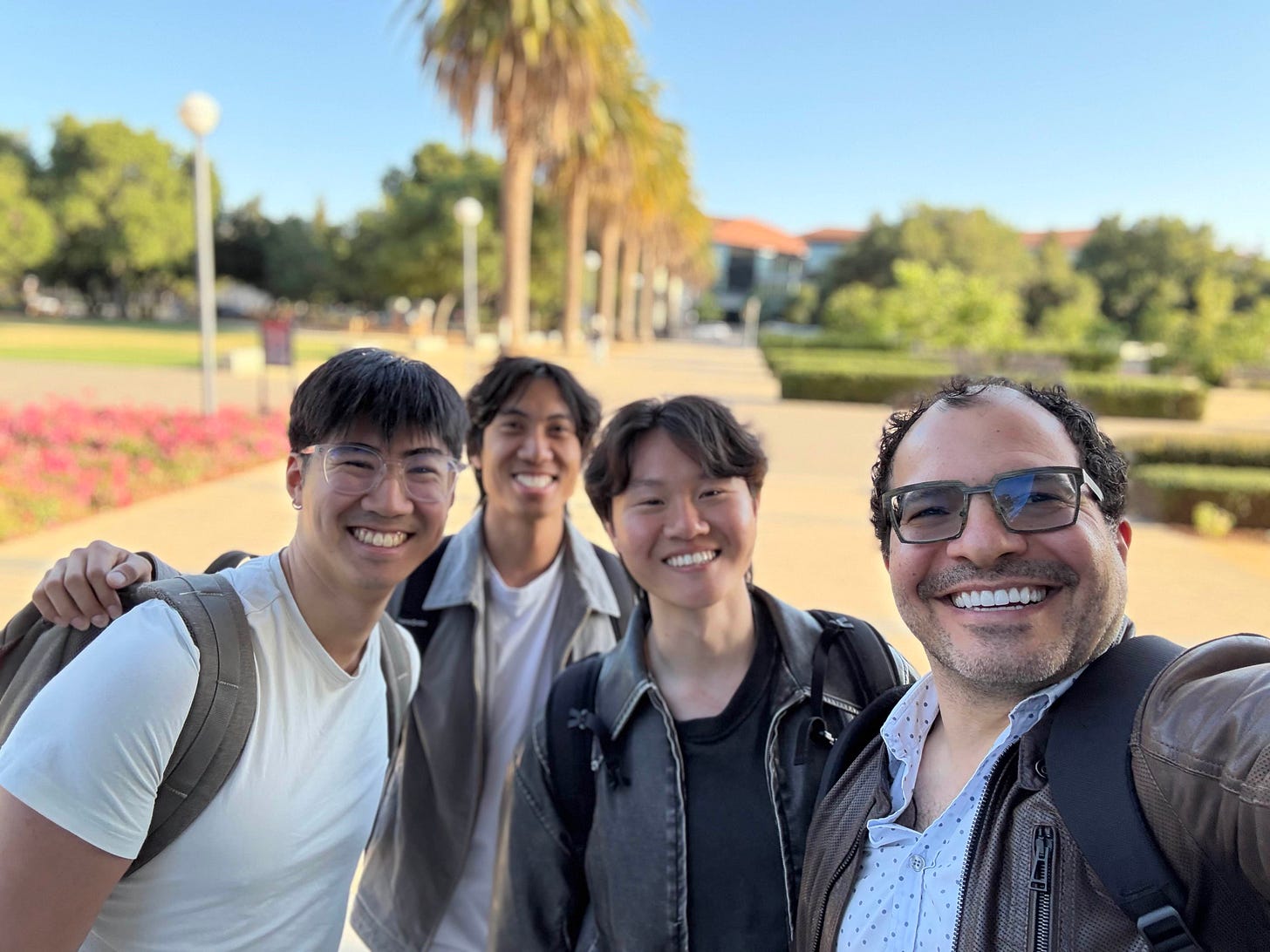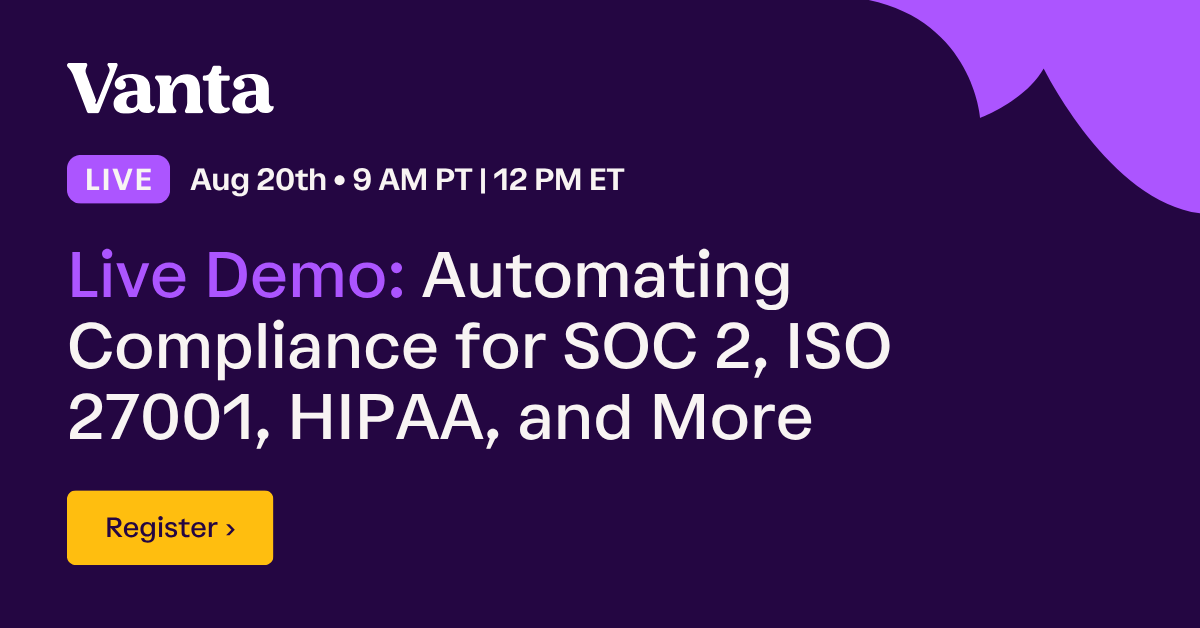This Startup Wants To Record Your Chores To Train Robots Better
Canadian startup Mecka AI launches with $8 million and brash young founders looking to build the Scale AI for robotics data.

Some of Silicon Valley’s top technologists now work on complex, humanoid robotics. Josh Gao wants to help them make latte art.
Gao’s startup, Mecka AI, hires baristas – and cooks, and mechanics – to film themselves performing basic tasks. Then it analyzes and labels the raw video for companies to use, by the anonymized thousands, to train AI models and make robots do their own pouring and chopping.
“We’ve made an early bet that human data goes a long way,” says Gao. “But video itself is not enough; you need to be able to extract all that information to make it useful.”
Toronto-based Mecka, which is launching from stealth today, claims it can handle both critical tasks: the recording, and the analysis. For businesses, Mecka can build custom data sets of specific functions or tasks, delivering back anonymized videos that have been labeled for ingestion by an AI model; for end users, Mecka promises a gig economy-like option to generate extra cash.
Home robotics company 1x Technologies is an early partner. Mecka claims to have paid contracts with several Fortune 100 corporations, too, though Gao won’t call them out by name.
Such early traction – or at least the hustle of Gao and co-founders Jason Chong, Duy Nguyen and Mogen Cheng – has helped Mecka AI raise an $8 million seed round led by Neo, with participation from SV Angel, A-Star Capital, Cade, Timeless and Offline VC.
What they’re all betting on: that Gao and Mecka can provide a new picks-and-shovels provider for physical AI, reminiscent of the role that Scale AI has played so lucratively with large language models.
Scale AI turned data labeling for those LLMs into a big windfall, as Meta paid $14 billion-plus to acquire about half of that company, its CEO and other key staffers in June. In Scale’s wake, multiple other startups have raised large funding rounds and built high-growth businesses, including Invisible, Mercor, and micro1.
If a similar market develops for robotics, Mecka’s upside would appear vast. Of course, it’s not so simple. Video data like Mecka’s requires hardware to record. AI robotics model makers, meanwhile, haven’t yet ceded the field to outsiders versus collecting their own data in-house.
And like its 20-something founders, Mecka is young and mostly unproven in this field. The startup has cryptocurrency roots as an attempt to decentralize data collection; its CTO Chong hails not from OpenAI or Google, but from Coinbase.
“None of us have a robotics background, which is pretty funny,” admits Gao. “But we came into the space with fresh eyes.”
He and his team of mostly Canadian engineers have a simple formula for winning the Upstarts way: “We’ve got more hustle,” Gao adds. More on that below.
Presented by Vanta.
Navigating new compliance requirements can be a daunting task, but with the right automation tools, it doesn't have to be. Whether you’re a fast-growing startup or an established security team, Vanta can help you achieve continuous compliance (and more).
Join the live demo on Aug 20 learn how Vanta can help you:
Streamline evidence collection and audit for frameworks like SOC 2, ISO 27001, HIPAA, and ISO 42001
Continuously monitor controls to build and reinforce your security foundation
Scale your program across internal and vendor risk, demonstrate trust, and answer questionnaires with automation and AI
Plus, get answers to your questions directly from the Vanta team.
Gundam Bros
Mecka AI is named after mecha, the giant piloted robots from the Japanese anime series Gundam. “Humans and robots,” with one letter changed, shrugs Gao.
A graduate of Ivey Business School at Western University in Ontario, Gao previously co-founded a startup offering software to ghost kitchens that was acquired in 2023. That same year, Gao, then 24 years old, earned a wave of local Canadian press for an AI translation app that he built as a side project to better communicate with his China-born parents.
Seeing the early development of AI-enabled robots, Gao was fascinated. He and his early collaborators started reading every research paper they could find, and visiting AI labs. “We realized there was a huge data bottleneck,” he says.
How would they build a data set of videos globally, and fast? Their answer was a crypto-inspired points program, which some users speculated on as a potential future token, which they launched last year. The project picked up some interest, though no official token followed, with some of its followers still lingering in Mecka AI’s X post replies.
It seemed like a good idea to “kickstart” user interest, says Gao. But for a group of founders without backgrounds in robotics research, it didn’t help their credibility. “When you’re working with larger companies, there’s still a bit of stigma,” he adds.
Chong, who served as co-founder and CTO of crypto startup Utopia Labs through its acquisition by Coinbase, says that he believes a token could still work, if a company had the resources and interest in collecting millions of hours of video of uneven quality. “If you’re not looking for that level of scale, then it’s probably more of a distraction,” he says.

Since then, Mecka has pivoted to gamified ‘daily quests’ that users can complete, like making their bed; a few thousand users have downloaded the startup’s app and remain active users, Gao claims.
Those lower-value videos only need a smartphone. For custom training runs commissioned by corporations, Mecka has developed its own hardware rigs to ship out to what it calls “higher tier operators” it can trust – mostly in Canada so far.
Those tasks might include answering a question like: “What does it feel like to grab a chair, then pull it back?” Such household motions were used by customer 1x in the generation of its World Model earlier this year, Gao says.
Sensing resistance
If you think that setup is nutty, bad business or simply semi-dystopian, you’re in good company. A number of AI investors and founders whom Upstarts contacted expressed skepticism. Mecka’s category is rapidly growing crowded, they say; it’s too expensive to operate; the data that robotics models require is too wonky, specific and fast-changing for the labs to outsource its collection.
“We get pitched one of these daily,” says a founder in robotics AI who asked to remain anonymous to speak freely. “It’s an entirely uninteresting category.”
Asked how much one of its rigs costs, Gao declined to comment, citing competitive reasons. But Animesh Garg, a professor of computer science at Georgia Tech who previously worked on machine learning for robotics at NVIDIA, can answer some of the doubts around Mecka’s domain credibility and data value.
A year ago, the Mecka team reached out to Garg after reading some of his research, to ask for help in designing their app. Now a research adviser to Mecka, Garg argues that the data that Mecka can collect – called “egocentric” because it focuses on the regular actions of an individual – is cheaper and more useful than the Internet’s how-to videos and compilations, which skip seemingly mundane steps, or contrived repetitions like a researcher folding the same tee-shirt 100 times.
Diverse geographies and backgrounds for the data will also be important for training humanoid robots, Garg argues. “This is an area where iteration speed matters a lot,” he says. “And the speed they’re operating at is ridiculous.”
“Get paid for the future that’s coming anyways.”
At lead investor Neo, Suzanne Xie says her team was impressed by the “extreme hustle and urgency” that Mecka has displayed in building a data set of 30,000-plus hours of video, which the startup believes is the largest of its kind.
While it’s too early to know if video data for robotics is a viable market (at least one prominent AI investor says they’re betting against that possibility), Xie argues that a company focused solely on that problem has the best chance to win. “The market is obviously very large, and there’s obviously a need for it,” she says. “Can you actually find the value capture at the right time, and quickly enough?”

Upstarts, meanwhile, is wondering about those baristas, auto mechanics and line cooks that Mecka AI would like to strap up with a recording rig.
Even in a society gripped by social media like TikTok, it’s easy to picture such a set-up getting someone fired.
“There’s some resistance from management, but we’re also finding enough people that don’t have it,” Gao says. Mecka benefits from word-of-mouth among professionals within a field to wrap up projects, he adds.
Then there’s the unpleasant reality that you’re recording your latte art for a robot to take away the task once it can figure out the perfect heart, or tree, cheaply enough. Gao doesn’t claim that his startup won’t contribute to short-term unemployment for some in his robotic future.
Instead, he makes the argument that we’ve heard often from AI entrepreneurs: better to ride the wave than get pulled under. “We will need to create new structures and incentives as a society,” Gao says.
In the meantime: “Get paid for the future that’s coming anyways.”
Correction: This story has been updated to reflect that while a Mecka crypto token was speculated, it never launched.




I’m curious how this type of company could support a use case where once the “motions” are captured - they are funneled into an AI model that can replicate ‘illions of the instances to help a mechanical bot learn and get better at automating that motion.
Think that barista scenario - once the model knows the basics - could it simulate it for thousands of drinks to speed up the learning curve?